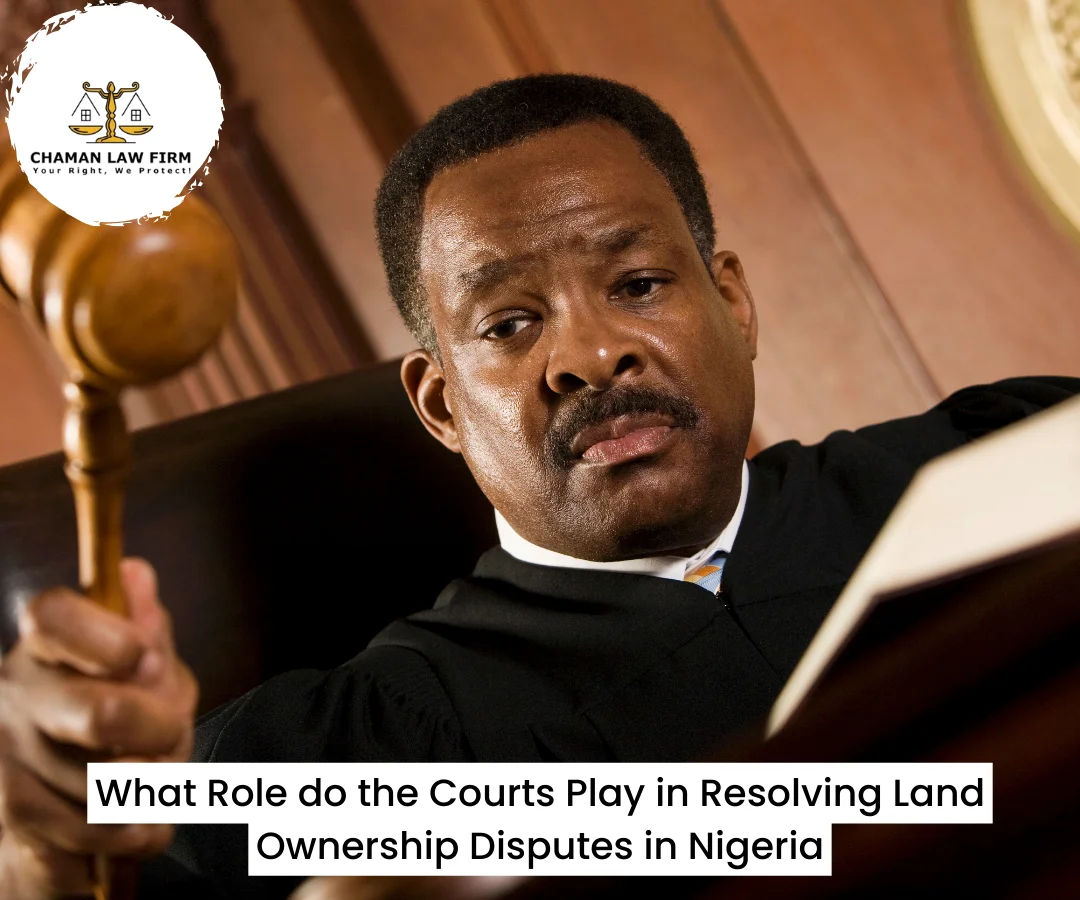The Role of Courts in Resolving Land Ownership Disputes in Nigeria: Legal Insights & Case Studies
Land ownership remains a contentious issue in Nigeria, often resulting in legal battles over rightful possession. Land ownership disputes in Nigeria arise from conflicting claims, inadequate documentation, and overlapping statutory and customary land laws. The courts play a crucial role in resolving these disputes by interpreting legal frameworks, evaluating evidence, and issuing enforceable judgments.
This article explores the legal process involved in resolving land ownership disputes in Nigeria, examining the judiciary’s role, applicable laws, and landmark case decisions that have shaped property rights in the country.
Understanding Land Ownership Disputes in Nigeria
Before delving into the judiciary’s role, it’s crucial to understand why land ownership disputes in Nigeria are so prevalent.
1. The Land Use Act of 1978: A Regulatory Framework
The Land Use Act (LUA) of 1978 vests all land in Nigeria in state governors, who administer it in trust for citizens. This law abolished absolute ownership of land, requiring individuals and organizations to obtain a Certificate of Occupancy (C of O) for legal recognition.
2. Common Causes of Land Ownership Disputes in Nigeria
The courts frequently handle cases related to:
Double Allocation of Land Titles – When government agencies mistakenly issue multiple land certificates for the same property.
Inheritance and Family Land Conflicts – Where multiple heirs claim ownership over ancestral land.
Encroachment – When one party unlawfully occupies another’s land.
Fraudulent Sales – Cases where unauthorized individuals sell land they do not legally own.
Boundary Disputes – Arising from unclear survey plans or encroachments.
The courts serve as the ultimate arbiter, determining legal ownership and protecting landowners’ rights in these disputes.
The Role of Courts in Resolving Land Ownership Disputes in Nigeria
The Nigerian legal system provides various judicial forums to address land ownership disputes in Nigeria, including customary courts, magistrate courts, high courts, and appellate courts.
1. Jurisdiction of Courts in Land Disputes
Customary Courts: Handle cases based on traditional land tenure systems and family land disputes.
Magistrate Courts: Handle smaller land disputes, such as encroachments and minor trespass claims.
High Courts: Have jurisdiction over complex land ownership disputes in Nigeria, including disputes over title documents, compulsory land acquisition, and eviction orders.
Court of Appeal & Supreme Court: Review decisions from lower courts and set legal precedents on land ownership disputes in Nigeria.
2. How Courts Resolve Land Ownership Disputes in Nigeria
A. Examination of Land Titles
The court process typically begins with verifying land ownership documents, such as:
Certificate of Occupancy (C of O)
Deed of Assignment
Survey Plans
Government Allocation Papers
In Odusoga v. Ricketts (1997) 7 NWLR (Pt. 511) 1, the Supreme Court ruled that a claimant must prove a valid root of title through documents or long-term possession.
B. Application of Legal Doctrines in Land Disputes
To determine true ownership, courts apply fundamental legal doctrines, including:
Nemo dat quod non habet (You cannot transfer what you don’t own): Protects buyers from fraudulent land sales.
Quicquid plantatur solo, solo cedit (What is affixed to the land belongs to the land): Governs encroachment and land development disputes.
Laches and Acquiescence: Prevents claimants from enforcing rights if they delay too long in filing claims.
C. Witness Testimonies & Expert Reports
Courts rely on:
Eyewitness accounts detailing the land’s ownership history.
Surveyor Reports to determine land boundaries.
Government Records confirming or denying land allocations.
In Arije v. Arije (2018) LPELR-44193(SC), the Supreme Court reaffirmed that landowners must prove ownership with credible evidence, not just oral claims.
D. Issuing & Enforcing Court Judgments
Once a court delivers judgment in a land ownership dispute in Nigeria, enforcement mechanisms include:
Eviction Orders for illegal occupants.
Injunctions preventing trespassers from further encroachment.
Compensation Payments in cases of wrongful dispossession.
In Otukpo v. John (2012) 7 NWLR (Pt. 1299) 357, the court awarded damages to a rightful landowner who was unlawfully evicted.
Challenges Courts Face in Resolving Land Ownership Disputes in Nigeria
1. Litigation Delays
Due to case backlogs, some land ownership disputes in Nigeria remain unresolved for decades, affecting economic development.
2. Corruption in the Judiciary
In some cases, wealthy individuals influence land dispute rulings by presenting fraudulent documents.
3. Conflicts Between Customary and Statutory Laws
Courts often struggle to harmonize customary land tenure with the provisions of the Land Use Act, leading to conflicting rulings.
4. Difficulties in Enforcing Court Judgments
Even after securing a favorable court ruling, rightful landowners face challenges enforcing judgments due to resistance from encroachers or government bureaucracy.
Recommendations for Improving Land Dispute Resolution
To enhance court efficiency in handling land ownership disputes in Nigeria, the following reforms are needed:
Digitization of Land Records – To reduce multiple land allocations and fraudulent claims.
Alternative Dispute Resolution (ADR) – Encouraging mediation and arbitration instead of prolonged litigation.
Judicial Reforms – Speeding up case resolution and eliminating corruption in land cases.
Public Awareness Campaigns – Educating Nigerians on the importance of proper land documentation.
Conclusion
The courts in Nigeria play an indispensable role in adjudicating land ownership disputes, ensuring fairness and upholding property rights. While land ownership disputes in Nigeria persist due to issues such as litigation delays and conflicting legal
frameworks, strengthening land governance, promoting ADR mechanisms, and improving court efficiency can significantly reduce conflicts.
For landowners, ensuring that their land titles are properly documented and seeking legal advice can help prevent land ownership disputes in Nigeria before they arise.


